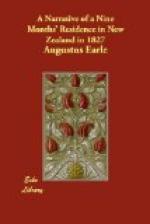The deaths of Hongi and Shulitea placed the missionaries and all the settlers on Kororarika Beach in considerable jeopardy: but it appeared as if reason had begun to dawn on the minds of these benighted savages, for this unjust and cruel custom was now for the first time discontinued. I was on the beach at the time when an immense party, well armed, came for the express purpose of satiating their revengeful feelings. I had taken the precaution of removing what I possessed on board a whaler then lying in the harbour. The chiefs first sat down to discuss the matter over amongst themselves, and their deliberations ended in their being satisfied with destroying the village of Matowe, the one adjoining ours, and which had been the residence of Pomare’s son, whose death was the cause of all the late turbulent events.
The great and leading defect in this country, and the principal cause of their frequent wars and disturbances, which harass and depopulate the tribes, and puts a stop to all improvement, is the want of some regular system of government. There are only two classes of people—chiefs and slaves; and, as consanguinity constitutes a high claim, the eldest son of a large family, who can bring the greatest number of warriors of his own name into the field, is considered the chief of that district or tribe; and as he, by reason of his followers, can take possession of the greatest number of prisoners or slaves, he becomes the ruling man. Every other man of his tribe considers himself on an equality with him in everything, except that he shows him obedience, and follows him to battle.
Each is independent in his own family, and holds uncontrolled power of life and death over every individual it contains. They seem not to exercise any coercion over the younger branches of a family, who are allowed unbounded liberty till the girls have sweethearts and the boys are strong enough to go to war. They are kind and hospitable to strangers, and are excessively fond of their children. On a journey, it is more usual to see the father carrying his infant than the mother; and all the little offices of a nurse are performed by him with the tenderest care and good humour. In many instances (wherein they differ from most savage tribes) I have seen the wife treated as an equal and companion. In fact, when not engaged in war, the New Zealander is quite a domestic, cheerful, harmless character; but once rouse his anger, or turn him into ridicule, and his disposition is instantly changed. A being, whose passions have never been curbed from infancy, and whose only notion of what he conceives to be his right is to retaliate for an offence with blood, must naturally form a cruel and vindictive character. Such these islanders seemed to us on our first visiting them. The sight of beings so extraordinary (for thus we Europeans must have appeared to them) excited in their savage minds the greatest wonder; and they thought we were sent as a scourge and an enemy; and though Cook, one of their earliest visitors, adopted every method his ingenuity could devise to conciliate them, yet, as they never could thoroughly understand his intentions, they were always on the alert to attack him. Hence arose the horror and disgust expressed formerly at the mere mention of the name of “a New Zealander.”




